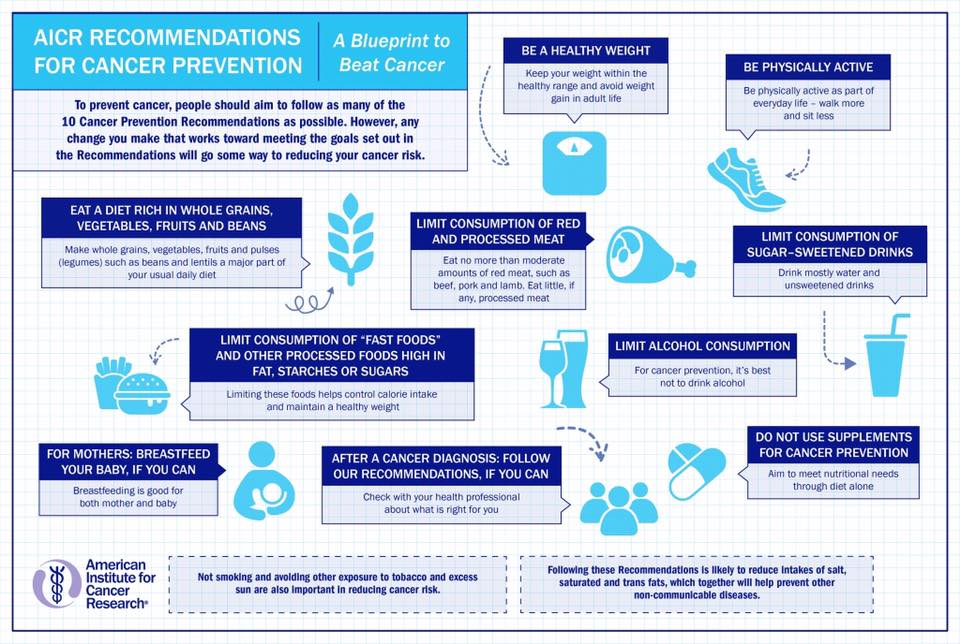The number of cancer survivors continues to grow, and is expected to exceed 22.1 million in the United States by 2030, according to a newly published report. As that group expands and includes more people living longer after cancer, we need to expand our way of thinking about survivors’ needs.
Changing Survivorship Concerns
Of today’s cancer survivors, 68% have passed the often-cited mark of five-year survival after diagnosis. In fact, nearly half are more than 10 years out from diagnosis. Cancer survivors can face a variety of additional health issues that vary with the type of cancer and its treatment, age, and health problems that existed or were emerging before cancer diagnosis. The good news is that these challenges are becoming more widely recognized, with whole new branches of oncology care aimed at addressing them.
As a registered dietitian nutritionist, I know we can help survivors address these issues through the medical care that’s so vital, as well as by identifying and supporting eating and other lifestyle choices that can make a difference for short-term and long-term survivorship.
Heart Health in Cancer Survivors
People are often surprised to hear that cancer survivors are at increased risk of having or dying from cardiovascular disease. Risk factors for heart disease such as high blood pressure, diabetes, abnormal blood lipids, smoking and obesity are reportedly more common among cancer survivors. Certain cancer treatments can increase risk of heart disease, and people who had cardiovascular risk factors before their cancer diagnosis are especially at risk of these side effects. Additional heart-related risk can result from declines in fitness. We’ve talked here before about growing evidence on the role that regular physical activity can play during and after cancer treatment.
Especially for survivors of early-stage cancer, reducing heart-related risk is worth including as part of an overall wellness journey. In April 2019, the American Heart Association issued a Scientific Statement emphasizing the need to address cardiovascular disease risk among cancer survivors. The report proposes a model called CORE — cardio-oncology rehabilitation — to identify cancer survivors at high risk of heart disease and use the approach long-used in traditional cardiac rehab to address their needs with exercise training, nutritional counseling, psychosocial care, and attention to cardiovascular risk factors. As in other forms of cardiac rehab, individualization in assessing risk and developing a plan addressing these factors is vital as a starting point.

Heart-Protective Eating for Cancer Survivors
The good news is that the AICR recommendations provide more than a blueprint for lifestyle choices that reduce cancer risk. They were specifically designed to fit with recommendations for better overall health.
In fact, research now shows that cancer and heart disease share several common risk factors. Key factors behind both diseases include chronic, low-grade inflammation and oxidative stress.
So what kind of eating habits can promote health on both heart and cancer fronts?
● Plant-focused eating provides a variety of nutrients and natural plant compounds that can function as antioxidants themselves or support the body’s own antioxidant defenses. Some seem to help shift cell signaling pathways away from inflammation. The potassium and polyphenol compounds in these foods can also help promote healthy blood vessels and manage blood pressure. A better blood pressure, in turn, means less oxidative stress and lower levels of hormones and growth factors that can promote cancer development. As you eat more minimally processed plant foods, you’ll be getting more dietary fiber, another win-win. Dietary fiber reduces the risk of colorectal cancer, and some forms of fiber may support gut bacteria that reduce chronic inflammation. Moreover, some forms of fiber provide added heart health support by lowering LDL cholesterol and reducing the rise in blood sugar after meals.
Whole grains, vegetables, fruits and pulses (like dried beans and lentils) all contribute, and they differ in the nutrients and phyto-compounds they provide. So give these foods a major portion of the real estate on your plate, and aim for a wide variety over the course of each week.
● Limiting red meat and minimizing processed meat is a core strategy for reducing risk of colorectal cancer, and can help protect heart health. Choosing lean options is heart-healthy, but it’s the starting point, not the whole strategy. Even lean red meats in excess amounts pose cancer risk. And growing evidence suggests that too much could also change gut bacteria in ways that promote inflammation. So keep red meat – that’s beef, lamb and pork – to no more than 12 to 18 ounces a week. Processed meats (like bacon, sausage and hot dogs) pose even greater risk of colorectal cancer, and they’re strongly linked with heart disease. So the recommendation is to make them an occasional choice, not an everyday choice.
There are lots of different swaps you can use to reduce red and processed meats, and all can both reduce cancer risk and promote heart health. Check the ideas I shared here, and consider which you might like to try.
● Avoid sugar-sweetened drinks and limit highly-processed foods. AICR recommendations include these action points not because of a direct effect on cancer risk, but because they often lead to excess calorie consumption and weight gain. These same recommendations are also made for heart health because of effects on blood pressure, blood triglycerides, and markers of inflammation. In addition, highly-processed foods are the main source of sodium in the U.S. diet, so cutting back is the most effective step for reducing excess sodium that can drive up blood pressure.
● Seek progress, not perfection. You might think that when trying to protect heart health and reduce cancer-related risks, vitamin or antioxidant-focused supplements would be the answer. But research is clear that while supplements might be helpful on an individual basis to fill a particular nutrient gap, they are not effective in reducing risk of cancer or heart disease.
Perfect habits are not the goal. Aim to move forward step-by-step in creating lifestyle habits that support long-term good health.





